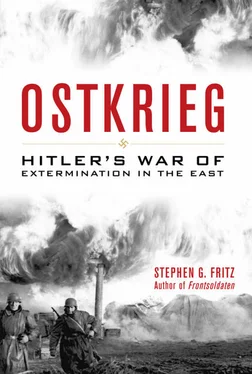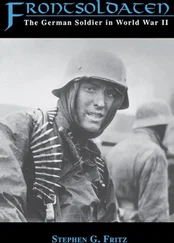Kitterman, David H. “Those Who Said ‘No!’: Germans Who Refused to Execute Civilians during World War II.” German Studies Review 11, no. 2 (1988): 241–54.
Klee, Ernst. “Die Ermordung der Unproduktiven: Euthanasie im Dritten Reich und ihre Aufarbeitung im Nachkriegsdeutschland.” In Ende des Dritten Reiches—Ende des Zweiten Weltkriegs: Eine perspektivische Rückschau , ed. Hans-Erich Volkmann, 341–67. Munich: Piper, 1995.
———. “Euthanasie” im NS-Staat: Die “Vernichtung Lebensunwerten Lebens.” Frankfurt: Fischer, 1985.
———, ed. Dokumente zur “Euthanasie.” Frankfurt: Fischer Taschenbuch, 1985.
Klee, Ernst, and Willi Dressen, eds. “Gott mit uns”: Der deutsche Vernichtungskrieg im Osten, 1939–1945 . Frankfurt: Fischer, 1989.
Klee, Ernst, Willi Dressen, and Volker Riess, eds. “The Good Old Days”: The Holocaust as Seen by Its Perpetrators and Bystanders . Translated by Deborah Burnstone. New York: Free Press, 1991.
Klein, Peter. “Die Erlaubnis zum Grenzenlosen Massenmord—das Schicksal der Berliner Juden und die Rolle der Einsatzgruppen bei dem Versuch, Juden als Partisanen ‘Auszurotten.’” In Die Wehrmacht: Mythos und Realität , ed. Rolf-Dieter Müller and Hans-Erich Volkmann, 923–47. Munich: Oldenbourg, 1999.
Klein, Peter, and Andrej Angrick, eds. Die Einsatzgruppen in der besetzten Sowjetunion, 1941/42: Die Tätigkeits- und Lageberichte des Chefs der Sicherheitspolizei und des SD . Berlin: Edition Hentrich, 1997.
Klemp, Stefan. “Kölner Polizeibataillone in Osteuropa: Die Polizeibataillone 69, 309, 319 und die Polizeireservekompanie Köln.” In Wessen Freund und Wessen Helfer? Die Kölner Polizei im Nationalsozialismus , ed. Harald Buhlan and Werner Jung, 277–98. Cologne: Emons, 2000.
Klemperer, Victor. I Will Bear Witness: A Diary of the Nazi Years, 1942–1945 . Translated by Martin Chalmers. New York: Random House, 1999.
Klink, Ernst. “The Military Concept of the War against the Soviet Union.” In The Attack on the Soviet Union (vol. 4 of Germany and the Second World War ), ed. Horst Boog, trans. Dean S. McMurrey, Ewald Osers, and Louise Willmot, 225–385. Oxford: Clarendon, 1998.
———. Das Gesetz des Handelns: Die Operation “Zitadelle,” 1943 . Stuttgart: Deutsche Verlags-Anstalt, 1966.
———. “The Conduct of Operations.” In The Attack on the Soviet Union (vol. 4 of Germany and the Second World War ), ed. Horst Boog, trans. Dean S. McMurrey, Ewald Osers, and Louise Willmot, 525–763. Oxford: Clarendon, 1998.
Klinkhammer, Lutz. “Der Partisanenkrieg der Wehrmacht, 1941–1944.” In Die Wehrmacht: Mythos und Realität , ed. Rolf-Dieter Müller and Hans-Erich Volkmann, 815–36. Munich: Oldenbourg, 1999.
Knappe, Siegfried. Soldat: Reflections of a German Soldier, 1936–1949 . Edited by Ted Brusaw. New York: Orion, 1992.
Knjazkov, Anatolij S. “Die sowjetische Strategie im Jahre 1942.” In Stalingrad: Ereignis–Wirkung–Symbol , ed. Jürgen Förster, 39–51. Munich: Piper, 1992.
Koch, H. W. “Operation Barbarossa—the Current State of the Debate.” Historical Journal 31, no. 2 (1988): 377–90.
———. “Hitler’s ‘Programme’ and the Genesis of Operation ‘Barbarossa.’” Historical Journal 26, no. 4 (1983): 891–920.
———. “The Spectre of a Separate Peace in the East: Russo-German ‘Peace Feelers,’ 1942–1944.” Journal of Contemporary History 10, no. 3 (1975): 531–49.
———. “Hitler and the Origins of the Second World War: Second Thoughts on the Status of Some of the Documents.” Historical Journal 11, no. 1 (1968): 125–43.
Kohlhaas, Elisabeth. “ ‘Aus einem Haus, aus dem eine weiße Fahne Erscheint, sind alle Männlichen Personen zu erschießen’: Durchhalteterror und Gewalt gegen Zivilisten am Kriegsende 1945.” In Terror nach Innen: Verbrechen am Ende des Zweiten Weltkrieges , ed. Cord Arendes, Edgar Wolfrum, and Jörg Zedler, 51–79. Göttingen: Wallstein, 2006.
Korol, V. E., and David M. Glantz. “The Price of Victory: Myths and Reality.” Journal of Slavic Military Studies 9, no. 2 (1996): 417–26.
Koschorrek, Günter K. Blood Red Snow: The Memoirs of a German Soldier on the Eastern Front . Edited by Roger Chesneau. Translated by Olav R. Crone-Aamot. Mechanicsburg, PA: Stackpole, 2002.
Krakowski, Schmuel. “The Death Marches in the Period of the Evacuation of the Camps.” In The Nazi Holocaust: Historical Articles on the Destruction of the European Jews (9 vols.), ed. Michael R. Marrus, 9:476–90. Westport, CT: Greenwood, 1989.
Krausnick, Helmut. Hitlers Einsatzgruppen: Die Truppe des Weltanschauungskrieges, 1938–1942 . Frankfurt: Fischer Taschenbuch, 1985.
———. “Kommissarbefehl und ‘Gerichtsbarkeitserlass Barbarossa’ in neuer Sicht.” Vierteljahrshefte für Zeitgeschichte 25, no. 4 (1977): 682–738.
———. “The Persecution of the Jews.” In Anatomy of the SS State , ed. Helmut Krausnick, Hans Buchheim, Martin Broszat, and Hans-Adolf Jacobsen, trans. Richard Barry, Marian Jackson, and Dorothy Long, 1–124. New York: Walker, 1968.
———. “Hitler und die Morde in Polen: Ein Beitrag zum Konflikt zwischen Heer und SS um die Verwaltung der besetzten Gebiete.” Vierteljahrshefte für Zeitgeschichte 11, no. 2 (1963): 196–209.
———. “Denkschrift Himmlers über die Behandlung der Fremdvölkischen im Osten (Mai 1940).” Vierteljahrshefte für Zeitgeschichte 5, no. 1 (1957): 194–98.
Krausnick, Helmut, Hans Buchheim, Martin Broszat, and Hans-Adolf Jacobsen, eds. Anatomy of the SS State . Translated by Richard Barry, Marian Jackson, and Dorothy Long. New York: Walker, 1968.
Krausnick, Helmut, and Hans-Heinrich Wilhelm. Die Truppe des Weltanschauungskrieges: Die Einsatzgruppen der Sicherheitspolizei und des SD, 1938–1942 . Stuttgart: Deutsche Verlags-Anstalt, 1981.
Kreuter, Siegbert. “Das Unternehmen Zitadelle vom 5.–15.7.1943.” Österreichische militärische Zeitschrift 41, no. 5 (2003): 583–86.
Kroener, Bernhard R. “ ‘Frontochsen’ und ‘Etappenbullen’: Zur Ideologisierung militärischer Organisationsstrukturen im Zweiten Weltkrieg.” In Die Wehrmacht: Mythos und Realität , ed. Rolf-Dieter Müller and Hans-Erich Volkmann, 371–84. Munich: Oldenbourg, 1999.
———. “The ‘Frozen Blitzkrieg’: German Strategic Planning against the Soviet Union and the Causes of Its Failure.” In From Peace to War: Germany, Soviet Russia, and the World, 1939–1941 , ed. Bernd Wegner, 135–49. Providence, RI: Berghahn, 1997.
———. “ ‘Nun, Volk, steh auf…!’ Stalingrad und der ‘totale’ Krieg, 1942–1943.” In Stalingrad: Ereignis—Wirkung—Symbol , ed. Jürgen Förster, 151–70. Munich: Piper, 1992.
———. “Organisation und Mobilisierung des deutschen Machtbereichs: Pt. 1, Kriegsverwaltung, Wirtschaft und Personelle Ressourcen 1939–1941.” In Organisation und Mobilisierung des deutschen Machtbereichs: Kriegsverwaltung, Wirtschaft und Personelle Ressourcen 1939–1941 (vol. 5/1 of Das deutsche Reich und der Zweite Weltkrieg ), ed. Bernhard R. Kroener, Rolf-Dieter Müller, and Hans Umbreit, 349–692. Stuttgart: Deutsche Verlags-Anstalt, 1988.
———. “The Manpower Resources of the Third Reich.” In Organization and Mobilization of the German Sphere of Power: Wartime Administration, Economy, and Manpower Resources, 1939–1941 (vol. 5/1 of Germany and the Second World War ), ed. Bernhard R. Kroener, Rolf-Dieter Müller, and Hans Umbreit, trans. John Brownjohn, 787–1154. New York: Clarendon, 2000.
Читать дальше












